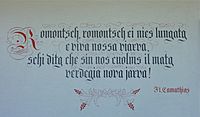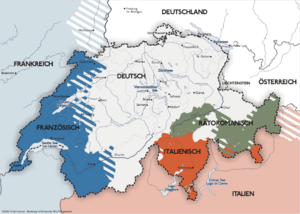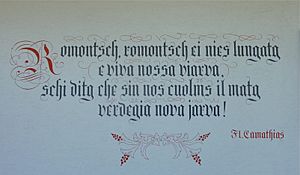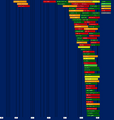Romansh language facts for kids
Quick facts for kids Romansh |
||||
|---|---|---|---|---|
| Rumantsch, Romontsch, Rumauntsch, Rumàntsch | ||||

Sursilvan house inscription in Trun
|
||||
| Pronunciation | [rʊˈmantʃ], [ʁoˈmɔntʃ], [rʊˈmɛntʃ], [rʊˈmaʊ̯ntʃ], [rʊˈrœntʃ] | |||
| Native to | Switzerland | |||
| Region | Grisons (Graubünden) | |||
| Ethnicity | Romansh Swiss | |||
| Native speakers | 35,000 (language of best command) (2000) 60,000 (regular speakers) |
|||
| Language family |
Indo-European
|
|||
| Standard forms |
Rumantsch Grischun
Putèr
Sutsilvan
Surmiran
Sursilvan
Vallader
|
|||
| Dialects |
Sursilvan
Vallader
Surmiran
Putèr
Sutsilvan
Jauer
Tuatschin
|
|||
| Writing system | Latin | |||
| Official status | ||||
| Official language in | ||||
| Linguasphere | 51-AAA-k | |||

The traditional Romansh-speaking parts of Switzerland (dark green)
|
||||
|
||||
Romansh (also spelled Rumantsch, Romansch or Romanche) is one of Switzerland's four national languages. The other three are French, German and Italian. About 50,000 people in the canton of Graubünden use it as their main language.
Contents
What is Romansh?
Romansh is a special language spoken in Switzerland. It is one of the four official languages of the country. This means it is recognized by the government. Most people who speak Romansh live in the Graubünden area.
Where is Romansh Spoken?
Romansh is mainly spoken in the Graubünden canton of Switzerland. This area is in the eastern part of the country. It is a mountainous region with many valleys. The language has been spoken there for a very long time.
How Many People Speak Romansh?
Around 35,000 people speak Romansh as their best language. About 60,000 people use it regularly. This makes it the smallest of Switzerland's national languages. Even so, it is an important part of Swiss culture.
The History of Romansh
Romansh comes from Latin, the language of the ancient Roman Empire. When the Romans came to the Alps, their language mixed with local languages. Over time, this mix became Romansh. It is part of a group called Romance languages.
How Romansh Developed
Romansh developed over many centuries. It changed as people moved and traded. Different valleys developed their own ways of speaking. This led to several different forms of Romansh.
Romansh and Other Languages
Romansh is related to other Romance languages like Italian and French. It is also part of the Rhaeto-Romance group. This group includes Ladin and Friulian, spoken in Italy.
Different Ways to Speak Romansh
Romansh has several different dialects. These are like different versions of the language. Each dialect is spoken in a specific area.
- Sursilvan: Spoken in the Surselva region.
- Sutsilvan: Spoken in the Hinterrhein valley.
- Surmiran: Spoken in the Surmeir region.
- Putèr: Spoken in the Upper Engadin valley.
- Vallader: Spoken in the Lower Engadin valley.
What is Rumantsch Grischun?
Because there are many dialects, it was hard to use Romansh in official ways. So, a standard version called Rumantsch Grischun was created. This version tries to combine features from all the main dialects. It helps people from different areas understand each other.
Why a Standard Language?
Having a standard language helps in many ways. It makes it easier to write books, newspapers, and school materials. It also helps Romansh be used more in government and media.
Romansh in Daily Life
Romansh is used in schools, local government, and some media. Children learn it in school in Romansh-speaking areas. There are also newspapers and radio programs in Romansh.
Romansh Culture
The Romansh language is a big part of the culture in Graubünden. It is used in songs, stories, and local traditions. People are proud of their language and work to keep it alive.
Protecting the Language
Because fewer people speak Romansh, there are efforts to protect it. The Swiss government supports the language. They help fund schools and cultural projects. This helps make sure Romansh continues to be spoken by future generations.
Images for kids
-
Vrin, the municipality with the highest percentage of people naming Romansh as their language of best command in 2000 (95.6%)
See also
 In Spanish: Romanche para niños
In Spanish: Romanche para niños












